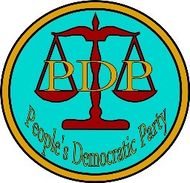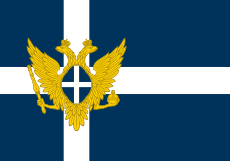People's Democratic Party
People's Democratic Party | |
|---|---|
 | |
| Leader | Alejandro Whyatt |
| Founded | 24 March 2015 |
| Membership | 7 |
| Ideology | |
| Political position | Centre |
| Colours | Yellow, Red, and Aqua |
| Seats in Parliament | 5 / 11
|
House of Parliament of Kingdoms and Lands Represented in the Council of the Triarchal Crowns of the Disciples (Mercia) | |
|---|---|
 | |
| Type | |
| Type | |
| Leadership | |
First Minister | Baron Whyatt, People's Democratic Party |
Deputy First Minister | Count Belcher, Independent |
| Structure | |
| Seats | 11 |
 | |
House of Parliament political groups | Government of Mercia
|
Political groups | The Loyal Opposition
Speaker
|
The People's Democratic Party of Mercia was a "centrist libertarian" political party in the Kingdoms and Lands Represented in the Council of the Triarchal Crowns of the Disciples also known as Mercia. The party described itself as Moderate and Secular, campaigning for changes to Mercian Legislature to ensure democratic fairness towards those who do not identify with faith. The party was also known for it's controversial ideology against the Noble Customs of Mercia, campaigning to abolish the Nobility of Mercia and instead allowing a Republican constitution to establish the parliament of Mercia. The PDP is a direct successor of the Humanist People's Alliance after Baron Whyatt dissolved the party for reform purposes. A Vote of No Confidence in Alejandro Whyatt ensued on the 27 August 2016, and passed on the 1st of September, which led to the end of the PDP.
History
The Humanist People's Alliance began to change after Baron von Uberquie left the party after a series of misguided debates and radicalist bills prompted harsh criticism from parliament on the 24th of January 2016. At that time, the HPA was the "Loyal Opposition" to the National Liberal Party. Baron Whyatt was elected as leader and two months later on the 24th of March the HPA was dissolved. The PDP was formed, with more policies forming the current libertarian/centrist stance of the party.
May 2016 Election
The campaign kicked off with a Mercian Party Leaders' Debate on the 20th April with Baron Whyatt representing the People's Democratic Party. The debate revealed that the top issues within Mercian politics at the time were how to make Mercia more active, question of the Mercian Christian Church & wider Christianity in general and its relation to the democratic stability of the nation, and the matter of the Mercian economy and banking system.
The election campaign lasted through April, when candidates declared that they would be standing in the election in the month-long nomination period. During this time, each party released their party manifesto with the PDP having two of their candidates make personal manifestos.
During the voting period, there were a major problem in the voting ballot. In this occurrence, a problem had occurred in which one candidate had previously declared in one voting range and then switched. This had not been updated in the NLP's manifesto which caused the Electoral Gorsedh's ballot to be wrong in two ranges, Wibertsherne and Loringia. The issue was not solved for four days in which a "Wibertsherne Reactionary Force" was started, threatening to secede from Mercia because of the voting ballot. Baron von Uberquie was in charge of the WRF with Baron Whyatt communicating this news. They were quickly condemned by Baron Cahill in his response as well as Baron Wu/McFarlane in their joint statement. Finally, seven days after the election should have ended, on May 7, a second ballot was issued with a re-vote occuring.
At the end of the election (on May 14), of the 11 seats being contested using the Single Transferable Vote system, the four seats in Loringia were taken by two National Liberal candidates and two People's Democratic candidates; no one ran in the Kernollond range from the PDP; and the four seats in Wibertsherne were taken by one People's Democratic Party candidate (Party Leader Baron Whyatt), an Independent Green Socialist and a NLP candidate. Of the eleven seats contested, this gave the National Liberals five seats, the People's Democratic Party three seats, the Social Democrats two seats, and gave Baron von Uberquie, the Independent Green Socialist, the last seat. For the first time in the history of Mercia, the National Liberal Party did not hold the majority of MP's. Therefore, the Independent Green Socialist, Social Democratic Party, and People's Democratic Party formed a coalition government. However, at the first Parliament meeting, Baron Wu (as well as Earl Clark of the SDP) didn't show up, so the NLP formed a government. At the next meeting however, Baron Whyatt was nominated and became the new First Minister after a Vote of No Confidence. Baron Whyatt is the current First Minister of Mercia, Baron McFarlane, a MP in Loringia, is the current Minister of Internal Affairs and Defence, and Baron Wu, a MP in Loringia, is the current Minister of Commerce & Charity.
August 2016 By-Election
Three seats were suddenly open for election because of Baron Billbrough (from Loringia) dropping out for inactivity, Baron Cahill (from Kernollond) no longer wanting to stay in Mercia, and Earl Clark (from Wibertsherne) leaving the community. The PDP prepared candidates for both Loringia and Wibertsherne, Baron Ned Gunderson and Baron William Harland-Hackenschmidt respectively. Baron Gunderson won the election in Loringia with 66% of the vote (and 56% turnout), and Baron Harland-Hackenschmidt won Wibertsherne with 60% of the vote (and 71% turnout). After this election, the People's Democratic Party became the largest party in Parliament, with 5/11 seats. Since they lacked a seat, they continued to stay in their coalition with the Green-Socialist Party and Independent Count Belcher.
Dissolution of the Party
Baron Newton von Uberquie of the GSP called for a Vote of No Confidence in Baron Whyatt's government on the 27th of August 2016. It passed on the 1st of September, 2016 and therefore Baron Whyatt resigned as leader of the PDP. Hugh McFarlane then became the leader of the PDP and called a vote to dissolve the party, which unanimously passed. Many of the members, regrouped, and formed the United Future Party, however it is not a direct successor as the UFP has different ideals than the former PDP.